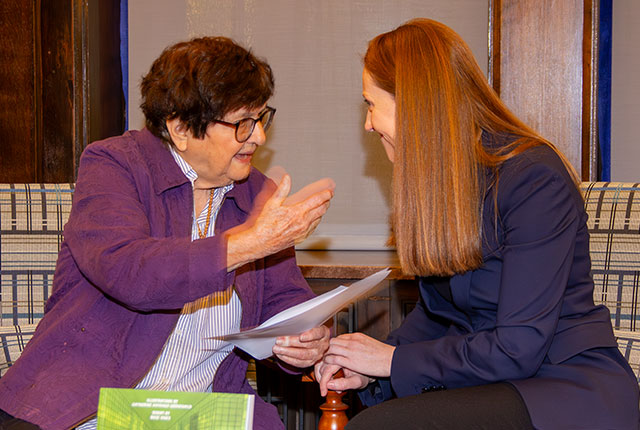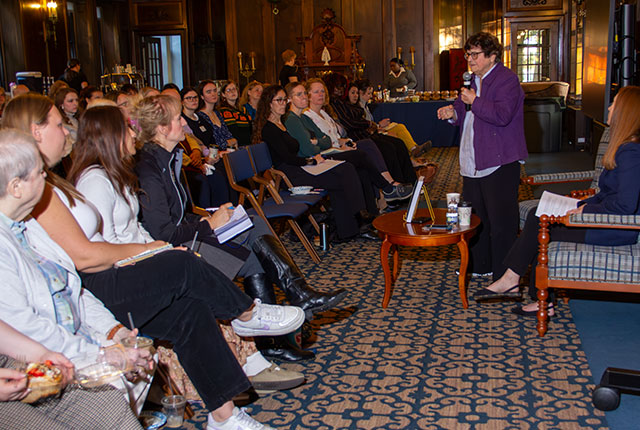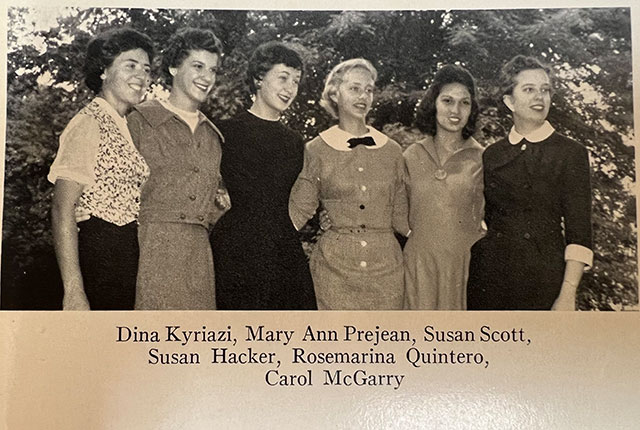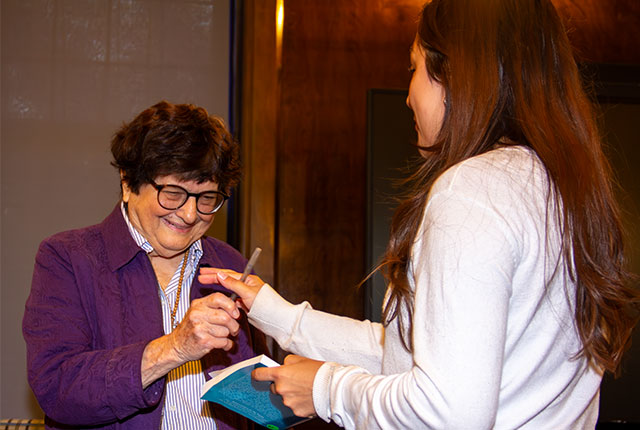Sister Helen Prejean, CSJ, Visits Saint Mary’s College…Again
Helen Prejean, CSJ, is a lecturer, activist, and author of several books, including The New York Times bestseller, Dead Man Walking. Prejean is a member of the Congregation of the Sisters of St. Joseph and is a leading advocate for abolishing the death penalty in the United States. In May 2025, Saint Mary’s College bestowed upon Prejean the title Honorary Doctor of Humane Letters, recognizing her lifelong ministry and pursuit of justice.

On Thursday, October 30, the Division for Mission hosted a breakfast and conversation with Sister Helen Prejean, CSJ. More than 110 students, faculty, and staff packed into Stapleton Lounge, and at 9 a.m. on the dot, Vice President for Mission Molly Gower, PhD, began introducing Sister Helen.
Prior to introducing Prejean, at 8:57 a.m. Gower asked her, “What do you think of the opening remarks?”
“This is a lot. Let’s just start with my connection to Saint Mary’s,” Prejean responded, with a wry smile.
So, Gower, a long-time fan who once slipped out of a high school course at age 14 to see Prejean speak for the first time, said: “Sister Helen is a storyteller who uses her storytelling for advocacy and for justice. After a pivotal moment of transformation, Sister Helen sees the teaching of Jesus—the work of the Gospel—as being with and for people who are poor, and I think that her life is a witness to the Good News.”

Prejean took it from there. Naturally, the native of Baton Rouge treated her audience as though she were holding court, like a matriarch calling her family to order. The audience held on to her every word. The energy was electric.
“[Today] is so special to me for a lot of reasons,” Prejean said. “First of all, I believe in women's education and the power of women in this country. Saint Mary’s, as you know, because of Sister Madeleva, became the first in the nation to offer master’s and doctoral degrees in theology.”
For over 180 years, Saint Mary’s has played a significant role in people’s lives. For Prejean, the influence of Sister Madeleva’s School of Sacred Theology shaped her own formation with theSisters of St. Joseph. She recalled one of Sister Madeleva’s essays, The Education of Sister Lucy. Through an imaginary character based on Madeleva’s mother, the essay explores ways of formally training women religious specifically as educators. Women religious around the world respond to the needs of the times, responding to those suffering on the margins by asking, “What is the need here?” But, in order to respond, the expansion of knowledge and understanding on a topic is vital.
This is important, Prejean said, because many women religious, not just educators, need foundational training in order to minister appropriately. The same could be said for most people, she added, noting that everyone benefits from that kind of grounding. Back then, all they needed was someone like Madeleva to show them the way, and she did.

“My sister came here in the ’50s,” Prejean shared, recalling how Mary Ann Prejean ’60 “learned how to ice skate out there on [Lake Marian] when it froze, and she learned how to jump over barrels.” Prejean talked about how Mary Ann, who passed away in 2016, loved her time at Saint Mary’s, including the campus farm, which was located where Regina Hall presently stands. “So anyway, I just have special connections,” Prejean said.
After that, Prejean dove into the purpose of her visit:
“Okay, let me tell you what happened. Y’all got to watch out for Sneaky Jesus,” Prejean led, referring to the ways in which the Holy Spirit can be present at the most surprising times. She shared an example through the story of how she first came into contact with Elmo Patrick Sonnier, a death row inmate convicted of murdering two teenagers, and whose story she told in Dead Man Walking.
“So here’s what happened. I started out, I mean, I was just a regular nun, right?” When she first stepped into Louisiana’s Angola Prison to meet Sonnier, she hadn’t a clue how her life was about to change. “When I came out into the dark, I had a deep realization of the Gospel.” This realization was historical, systemic, and steeped in the deep racial wounds of the American South, Prejean said.
“You’ve got to look at the pattern—the former slave states, the Deep South states, are the ones doing the executions. Over 80 percent of executions happen in former slave states where racism, the legacy of slavery, is still dominant. It’s very prominent in the criminal justice system.”
“And I mean, you see it. I began to see it. I began to learn everything. I knew nothing,” she continued. “The nun is in over her head. But boy, I’m learning.” Prejean told the Saint Mary’s audience that this lesson was not one she would have ever learned in a classroom. “That kind of knowledge comes to us on the ground, which is why we need sociology to understand patterns in society, how we are affected by what we see, what we hear, and what we learn.”
She said this experience transfigured her. “It was like the sacraments. Some sacraments leave an indelible mark on the soul. Well, this witness of an execution was one of those. Like a second baptism for me.”
This “second baptism” led to the #1 national bestseller Dead Man Walking. When Prejean began writing, she discovered she needed to take her readers with her on the entire journey, telling the full story of the murders and their aftermath, in addition to her involvement with Sonnier. “You’ve got to deal with what did they did. Why was Pat Sonnier on death row? Why was [his accomplice] given two life sentences instead of death? What was the crime? Who suffered? Who were the victims?”
“When I did the first draft of Dead Man Walking, I was all into the human rights of the person about to be executed,” Prejean admitted. Her Random House editor, Jason Epstein, didn’t let her off easy. “He said, ‘You’re a good, gritty writer, and that’s what you want to be, but you’re also a nun. People are going to expect every religious platitude to come out of your mouth. [That] is a hard, hard sell. Two teenage kids were murdered. If you don’t start with that crime and your own horror and outrage at their deaths, nobody’s going to read your book. They’ll think you can’t go there. You’ve got to go to both sides.’”
Epstein’s advice didn’t stop there, Prejean said, recounting his words: “‘You [say], “I’d never done this before,” but it was cowardice, wasn’t it? You were scared. So, when you write your book, don’t just take people with you on the peaks; take them into the troughs. When you make a mistake, let them see it. Then they’ll trust you.’”
Prejean had to challenge herself. “I thought so often of the cross—the two arms that stretch us when we live the Gospel of Jesus. Where’s Jesus in that execution chamber? Yes, he’s there with the human being who did that terrible crime. But he’s also with the victims. I was scared to see them. I figured I’m the last person in the world they’d want to see—me, the nun who’s the spiritual advisor to the men who killed their children. Because they need healing. They need help… and it’s a terrible aftermath.”
Leaning into that fear launched what would become Prejean’s 30-plus-year ministerial career, all while watching her bestseller evolve into a play, an opera, and now Dead Man Walking: The Graphic Edition.
“We are going to get the graphic edition of Dead Man Walking out to young people—which is you–” she said, pointing to students in the audience, “the next generation, so you can be involved in human rights.” All 110 audience members walked out of Stapleton Lounge with their own copy of the brand new edition.

Prejean was on campus as part of her annual visit to the University of Notre Dame. “Notre Dame is such a Catholic bastion. I work with them [on] social justice and human rights,” and vowed to come back to Saint Mary’s each year to do this every year. She had a message for those who are grappling with social injustices they witness in their communities, on the news, or on their phones:
“Recognize moral injury… stay close in community, and learn… We are the presence of Christ in the world, and He doesn't have any eyes except ours, hands except ours. When we can recognize the moral hurt, because we see political violence being lived out in so many ways, we've got to be present, and we’ve got to raise our voices in any way we can. But we can't do it without sticking [with our communities].”
